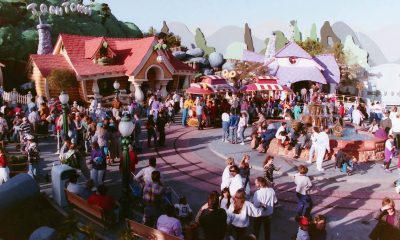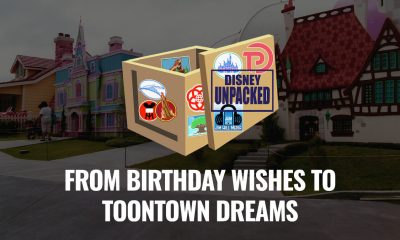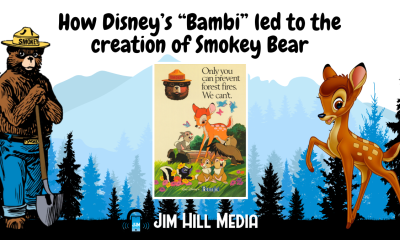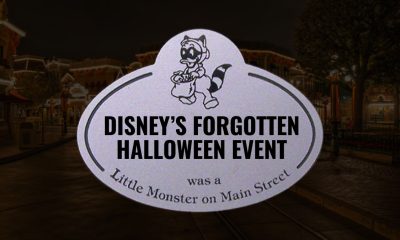Music Theatre, Stage, & Performance Art
How Disney World’s Hoop-Dee-Doo Musical Revue almost didn’t make it

It’s the show that many Disney World employees thought would
never make it through the Summer of 1974. Let alone still be going strong 37
years later.
“On our opening night at Pioneer Hall, our audience
consisted of six tables worth of Guests. That’s one table per member of the
cast,” recalled Gary Goddard, one of the many talented folks involved with the
creation of the Hoop-Dee-Doo Musical Revue. “By the end of our first month of
performances, things were looking somewhat better. We were playing to
half-empty houses by that point. But things were so touch-and-go for a while
there that we wondered whether Disney World management was actually going to give
this dinner show the time that it needed to catch on with the Guests.”
Mind you, you can understand Mouse House managers’
frustration. The Arab oil embargo (which had run from October of 1973 through
March of 1974) had had a horrific albeit temporary impact on WDW’s attendance
levels. And now that there was enough gasoline available around the country that
tourists could once again drive down to Orlando and vacation with Mickey, the
pressure was really on to make sure that every facility on property was focused
on turning a profit.

Workmen put the finishing touches on Fort Wilderness’ Pioneer Hall in February of 1974.
Copyright Disney Enterprises, Inc. All rights reserved
Now Pioneer Hall had just opened in April 1, 1974. And WED’s original plan for
this new Fort Wilderness facility was that it would serve breakfast & lunch
to the Guests who were staying at the campground. But as to what would happen inside
of Pioneer Hall once night fell … Well, given that the Imagineers had hoped
that most WDW visitors would still be inside of the Magic Kingdom at this point
and/or be enjoying one of the Vacation Kingdom’s other recreational opportunities,
they didn’t put a whole lot of thought into Pioneer Hall’s nighttime entertainment
line-up.
“My understanding is – given that Fort Wilderness was supposed
to be the place where WDW Guests would stay if they wanted to get closer to
nature – that the nighttime programs that the Imagineers had initially envisioned
for Pioneer Hall were to have reinforced that idea,” Goddard continued. “So
they were originally going to present animal programs in there, so that campers
and their kids could then get to see some Central Florida wildlife up close.
Plus there was talk that they might screen some of Disney’s old True-Life Adventures movies
in there on a
nightly basis.”
But – again – all of that changed in the Spring of 1974.
Where – on the heels of the Oil Crisis – every dollar now counted. Which is why
WDW execs turned to Bob Jani (i.e. the then-Vice President of Entertainment for
both Disneyland and Walt Disney World) and tasked him with coming up with a concept
for a new live dinner show that could then be presented inside of Pioneer Hall.

Cast of WDW’s Polynesian Revue from the early 1970s. Copyright
Disney Enterprises, Inc. All rights reserved
“The luau at the Polynesian was doing so well at this point
that it was selling out every night. They were actually turning Guests away. And
the feeling in-house was that – if Disney World were able to get another
nighttime dinner show up & running somewhere else on property … Well, that
show might then be offered as an alternative to the Guests who were
disappointed about not being able to get a reservation for the Polynesian
Revue,” Gary explained.
The only problem was that Pioneer Hall hadn’t really been
designed as a performance space. The wide stone pillars that held up the building’s
balcony had a pretty detrimental effect on this hall’s sightlines. And then
there was the matter of there being absolutely no money in WDW’s entertainment
budget when it came time to hire the cast of this proposed new nighttime show.
“That’s why the original cast of the Hoop-Dee-Doo were all
members of Disney World Fine Arts College Workshop program. These were kids who’d
come down to the Resort to perform over the Summer. They thought that they’d be
dancing in the Magic Kingdom or singing at the Top of the World. But they wound
up in our backwoods show instead,” Goddard laughed.

Copyright Disney Enterprises, Inc. All rights reserved
The initial plan for Hoop-Dee-Doo was that it would run for just
12 weeks over the Summer of 1974. But as I mentioned at the top of today’s
article, the audiences that initially turned out for this new offering at
Pioneer Hall were so small that … Well, the show’s creative team & cast allegedly
heard rumors that Mouse House managers were thinking about pulling the plug on
this production just two weeks into its run.
“But that was only because no one knew – at that time,
anyway – that we were out at Fort Wilderness doing this new fun dinner show. And
given that there was no money in our budget for promotion of Hoop-Dee-Doo, I
took it upon myself to start advertising the show,” Gary remembered. “I personally
made up a set of flyers and posters which I then hand-delivered to each of the
on-property Disney hotels. I then made a point of meeting with each of the
concierges at these hotels and inviting them to come see Hoop-Dee-Doo. So that
they’d then start talking up the show to the Guests.”
And – in the end – Goddard’s effort paid off. The
Hoop-Dee-Doo Musical Revue eventually grew to be so popular with WDW visitors that,
for a time, the Imagineers actually toyed with moving this nighttime dinner
show out of Pioneer Hall and then restaging it outdoors on a far grander scale.

Dorothea Redmond’s concept painting of the performance space which was proposed
for that greatly expanded outdoor version of the Hoop-Dee-Doo Musical Revue.
Copyright Disney Enterprises, Inc. All rights reserved
“When I was initially hired by WED in 1975, one of my very first
assignments was to help create some additional entertainment offerings at Fort
Wilderness. I worked with Marc Davis to help design this walk-thru funhouse
called the Old Barn,” Gary said. “I also
helped design this new outdoor version of the Hoop-Dee-Doo Revue which was
going to be staged on this full-sized Western street. Where you wouldn’t have
just heard the cast pull up outside in a stage coach, you’d have actually seen
that stage coach roll onstage pulled by a team of live horses. And an audience
of 1500 people could have watched this live show all at the same time – with chorus
lines of dance hall girls & epic gun battles & stuntmen falling out of
rooftops — from across the street, where they sit eating inside of the
Deadwood Steakhouse. Which was going to be this big open-air restaurant.”
And even though Card Walker, the then-Chairman of Walt
Disney Productions, reportedly thought that this greatly expanded version of
the Hoop-Dee-Doo Musical Revue was one of the greatest ideas that he’d ever heard
and actually proposed using a network TV special as a way of making would-be
Disney World visitors that this new entertainment alternative was now open at
the Resort … This obviously promising
concept never quite made it off of the drawing board.
Which is why – to this day – people have to make
reservations six months in advance in order to secure a seat inside of Pioneer
Hall. In spite of presenting three shows nightly of the Hoop-Dee-Doo Musical
Revue, Disney World still can’t meet guest demand. Which – given that it’s been
more than 37 years since he initially worked on this show with Bob Jani, Ron
Miziker, Larry Billman and Tom Adair – still amazes Gary Goddard.

Copyright Disney Enterprises, Inc. All rights reserved
“This was a show that only could have happened at Walt
Disney World in the early 1970s. Back then, management was far more hands-off.
More to the point, because we were working out of Pioneer Hall at the Fort
Wilderness campground, we were really off the Company’s radar for quite a
while. So we then had the time we need to fine-tune this show, add new gags,
change the order of things,” Goddard smiled. “Of course, once Dick Nunis and
Bob Matheison came around during our second months of performances and saw that
we had cast members jumping from the balcony down onto the stage … Well, for
safety reasons, they had us restage that part. But beyond that, they really
loved the show.”
And so do most Walt Disney World visitors. Which is why –
since June 14, 1974 – the Hoop-Doo-Dee Musical Revue has been presented over
35,000 times. Which makes this nighttime dinner show the most popular &
longest-running live entertainment production that The Walt Disney Company has
ever staged.
Which – when you consider how close Pioneer Hall came to
being this place where campers could go at night to see live animal demos of
creatures that had been shipped over from Discovery Island and/or watch
screenings of “The Living Desert” or “The Vanishing Prairie” – is just kind of
bizarre.

Copyright Disney Enterprises, Inc. All rights reserved
So how many of you JHM readers are among the 10 million WDW
visitors who have seen the Hoop-Dee-Doo Musical Revue over the past 37 years?
And – if you have seen this nighttime dinner show – what’s your favorite
bear-related pun from that “Mammoth Historical Pageant” which closes out these
proceedings? Mine is “How could you do this to my next-of-skin?”
Your thoughts?
Planning a Disney vacation?
Let Disney only travel company
Mouseketrips help you.
Music Theatre, Stage, & Performance Art
Hercules: The Muse-ical

Quick trivia question: What were the names of the three stage shows that were presented on the Disney Magic on that vessel’s maiden voyage back in July of 1998?
- “Disney Dreams”
- “Voyage of the Ghost Ship”
- And “Hercules: The Muse-ical”
It’s that last show – which is based on the hand drawn animated feature that Walt Disney Pictures released back in June of 1997 – that occupies an interesting spot in Mouse House history. Largely because Disney’s “Hercules” (the movie, not the stage show) arrived in theaters at a time when the folks who ran the animation side of the operation at Disney Studios were getting a wee bit nervous about the Company’s supposed supremacy over feature animation.
Disney Animation Success: Aladdin & The Lion King
Some three years previous (June of 1994, to be exact), no one in Hollywood had any doubts at all about who was the top dog when it came to feature animation. And that was because “The Lion King” had just arrived in theaters and was such a huge hit at the world-wide box office. $312 million in ticket sales in North America alone.
To put that in perspective: Disney’s previous biggest hit, at least when it came to hand-drawn animated features, had been “Aladdin.” Which arrived in theaters some 20 months earlier in November of 1992 and had sold $217 million worth of movie tickets domestically. So what with “The Lion King” earning basically one-and-a-half times what “Aladdin” had (Mind you, that’s just the domestic release of this movie that we’re talking about here. Overseas, “The Lion King” made $545 million. Which – compared to the $286 million that “Aladdin” made overseas back in 1992 – that’s nearly double the business) … We’re talking some very serious moola.

DreamWorks SKG
But then – in August of 1994 – Jeffrey Katzenberg is forced out as the Chairman of Walt Disney Studios. He – in turn – joins forces with Steven Spielberg & David Geffen. And – just two months later (October of 1994) – launches DreamWorks SKG. And one of the key components of this brand-new entertainment conglomerate is an animation studio. Which is then supposed to go head-to-head to the Mouse House.
Cold Streak for Disney Animated Films
Compounding this situation is that Walt Disney Feature Animation suddenly starts to have a cold streak. Where “The Lion King” sold $312 million worth of tickets when it was released to North American theaters in the Summer of 1994, Disney’s “Pocahontas” (which is released to theaters just one year later in June of 1995) does less than half that business. $141 million in domestic ticket sales to be exact.
And then – when Disney’s “Hunchback of Notre Dame” arrives in theaters just one year after that in June of 1996 – it does 2/3rds of the business that Disney’s “Pocahontas” had done the previous year. It sells $100 million, $100 thousand worth of tickets in North America. Which – given that Disney’s animated “Hunchback” costs a reported $100 million to make … That’s a problem.
Hercules is Coming: Disney Goes All-Out to Promote New Film
So as the Summer of 1997 looms, Disney is now looking to reverse this box office trend. The Studio needs another “Lion King” -sized hit to show those guys at DreamWorks SKG who’s really the boss in Hollywood when it comes to feature animation. And the Mouse is going to use every tool that it has in its promotional tool kit to make sure that every would-be movie-goer knows that “Hercules” is on its way and it’s a big, bright, colorful, really funny animated feature just like Disney’s “Aladdin.”
Side note: Figuring that Robin Williams’ star power was one of the reasons that Disney’s “Aladdin” had zoomed to the top of the box office back in November of 1992, the Studio initially wanted to use the same sort of stunt casting to make Disney’s “Hercules” a must-see movie-going event. Which is why they originally wanted Jack Nicolson to be the voice of Hades and then hire the Spice Girls to served as the voices of the Muses.
Sadly, in both of these cases, though the Company had meetings with Nicholson and the Spice Girls’ representatives, the cost of hiring these performers to voice characters in Disney’s “Hercules” proved to be prohibitive. So that stunt casting idea was ultimately abandoned.
Hercules Mega Mall Tour
Anyway … Back to promoting “Hercules” as only Disney could … This meant – starting in February of 1997 – the Company sent out the “Hercules” Mega Mall Tour. Which – to raise awareness of the June debut of this new full-length animated feature from Walt Disney Studios – involved stops in 20 different cities around North America over five months time. Over the course of this tour, 4 million cassettes of “Zero to Hero” (The song that Alan Menken & David Zippel had written for this animated feature that – it was felt at the time – had the best chance of being the break-out single from the “Hercules” soundtrack) were handed out to mall patrons.

Hercules New York Movie Premiere
And speaking of June … To make sure that as many people as possible were made aware that Disney’s “Hercules” was opening in theaters, the Company decided to stage the world premiere of this new Ron Clements & John Musker movie in New York City. Not only that, but to present a week-long series of screening of Disney’s “Hercules” in the just-renovated New Amsterdam Theater (which would – just 5 months later, in November of 1997 – would then become home of the Company’s long-running smash hit Broadway musical version of “The Lion King”).
Hercules Electrical Parade
And – to make sure that everyone in NYC knew this was happening – Disney got special permission from then-New York City mayor Rudi Guiliani to roll the Main Street Electric Parade (which, for this one-time promotion event, was renamed the “Hercules Electrical Parade”) down 42nd Street and then up 5th Avenue.
Speaking of parades … To make sure that theme park goers knew that Disney’s “Hercules” was now in theaters, a “Hercules” – themed parade rolled through four different theme parks that Summer.
- Disneyland Park in Anaheim
- Disney-MGM in Florida
- Disneyland Paris in France
- and also at Tokyo Disneyland in Japan
It was an unprecedented promotional effort on the Company’s part. More to the point, because they were absolutely certain that “Hercules” was going to turn out to be another “Aladdin” or a “Little Mermaid” (The two animated features that Ron Clements & John Musker had previously made for the Mouse House. Which had then turned into these hugely lucrative franchises for The Walt Disney Company which had gone on to have surprisingly long shelf lives) … Well, that’s Disney – even before “Hercules” had actually arrived in theaters – began making plans as to how it could then extend the shelf life of this particular IP.
Disney’s Hercules: The Animated Series
One way was “Disney’s Hercules: The Animated Series.” Which was basically a prequel to that theatrically released animated feature. 65 episodes of “Disney’s Hercules: The Animated Series” were produced and then began airing on ABC in September of 1998.
Hercules: The Muse-ical on the Disney Magic
But six weeks prior to that (in late July of that same year), the Disney Magic had its maiden voyage. And Guests who sailed on this 984-foot-long, 84,000-ton vessel were treated to performances of “Hercules: The Muse-ical.” I’ve also seen this stage show referred to as “Hercules: The Muse-ical Comedy.”
There’s only one problem with this plan. This new stage show was debuting onboard the Magic some 13 months after Disney’s “Hercules” had originally arrived in theaters.
Hercules the Box-Office Disappointment
By now, everyone knew that this Ron Clements & John Musker movie had been a box office disappointment.
Only selling $99 million worth of tickets in North America – making “Hercules” the first Disney animated feature to not blow through the $100-million-at-the-domestic-box-office barrier since “The Rescuers Down Under” back in November of 1990.
Disney Cruise Musical Success: Hercules: The Muse-ical & Villains Tonight
Which – you’d think – would have doomed “Hercules: The Muse-ical” to a very short run on the Disney Cruise Line. But here’s the thing: people who voyaged on the Disney Magic (and – later – the Disney Wonder. Which got its own clone of this stage show) just loved “Hercules: The Muse-ical.” They just loved how this stage show was one part stand-up comedy act and another part well-put together musical review.
Which is when – when “Hercules: The Muse-ical” came to the end of its run (in 2005 on the Magic & then in 2008 on the Wonder) – Disney’s Entertainment Department did a very unusual thing. They crafted a sequel show of sorts, “Villains Tonight.” Which brought back the three most popular characters from “Hercules: The Muse-ical” (i.e., Hades, Lord of the Dead and his hapless minions, Pain & Panic) and then had this trio interact with some of Disney’s most famous fiends. Among them Maleficent from “Sleeping Beauty,” the Evil Queen from “Snow White,” Ursula from “The Little Mermaid” … you get the idea.
“Villains Tonight” debut on the Disney Magic in 2010 and quickly proved to be so popular that this stage show was then replicated for the Disney Dream the following year (2011). “Villains Tonight” had a healthy run on both boats, with the Disney Magic version of this show closing up shop in November of 2015 and the Disney Dream version shuttering in August of 2017.
Stage Adaptation of Hercules
But here’s the weird part: These long-running “Hercules” -inspired stage shows proved that there was actually an audience out there for a full-scale Broadway musical version of this Ron Clements & John Musker movie. Which is why – back in September of 2019 – the Public Theater (for one week only) staged … Well, kind of a trial production for a stage adaptation of Disney’s “Hercules.” It was presented outdoors at the Delacorte Theater in Central Park with a cast of 200.
This stage version of Disney’s “Hercules” got such great reviews (in large part thanks to Roger Bart’s performance as Hades, Lord of the Dead.
Fun fact: Mr. Bart was the singing voice of young Hercules in the original animated feature. So when you hear teenaged Herc belting out “I can go the distance,” that’s actually Roger who singing. Bart’s spent the past 25 years being closely associated with this IP)
This world premiere of a stage version of Disney’s “Hercules” was so well received that a follow-up production was immediately put in the works.
Of course, then the pandemic happened. Which then slowed down the momentum for this stage version of Disney’s “Hercules” a little bit. But that follow-up production now has a venue – the Papermill Playhouse in New Jersey (which is where the stage version of Disney’s “Newsies” started off life back in September 2011 and then went on to great success of Broadway). We’ve also got some production dates for that show: February 9 – March 12, 2023.
Disney’s Live-Action Hercules
What’s kind of weird about the timing of all this is – while Disney Theatrical is readying a stage version of “Hercules” – (June 2022), it was revealed that Walt Disney Studios has a live-action version of its animated “Hercules” in the works. This big budget project will be directed by Guy Ritchie (who directed that live-action version of Disney’s “Aladdin” which debuted in theaters back in May of 2019 and then went on to sell over a billion dollars worth of ticket at the worldwide box office) and produced by Joe & Anthony Russo.
That’s significant. Given that Joe & Anthony Russo are the guys who directed “Avengers: Infinity War,” “Avengers: Endgame,” “Captain America: Civil War” and “Captain America: The Winter Soldier.” Which tells us that the action scenes in this upcoming live-action musical comedy are going to feature Marvel-level FX work. Which will make this “Hercules” remake / reboot a must-see for Marvel fans.
More Hercules Musicals on Cruise Ships?
So – long story short – “Hercules: The Muse-ical” & “Villains Tonight” proved that there was an audience out there for a stage version of this Ron Clements / John Musker movie. Which then led to the world premiere of the stage adaptation of Disney’s “Hercules” at NYC’s Public Theater in September of 2019. Which eventually led to a second production of this stage, which will bow at NJ’s Papermill Playhouse in just six months time.
But is it possible that Disney’s “Hercules” could eventually make its way back onto the Company’s cruise ships? It is worth noting here that – following the success of the live-action reboot of its animated “Beauty & the Beast” (That Bill Condon film was released to theaters back in March of 2017 and then went on to sell $1.2 billion worth of tickets worldwide), the Disney Cruise Line then mounted an all-new stage version of “Beauty and the Beast” that was then based on that live-action remake.
This production debuted on the Disney Dream back in November of 2017 (some eight months after the live-action “Beauty & the Beast” reboot originally debuted in theaters). So it stands to reason that – if Disney Studios’ upcoming live-action reboot of its animated “Hercules” is equally successful – this film too could eventually become fodder for a future stage show that could then be presented onboard the Disney Cruise Line.
Hades – The Lord of the Dead
One final note: Given that Hades was the break-out character in both of those Disney Cruise Line productions (i.e., “Hercules: The Muse-ical” & “Villains Tonight.” FYI: Both of these DCL shows are currently available for viewing on YouTube), it’s worth noting here is that how Hades is reportedly based on is actually one of the notorious in-jokes in Hollywood history.
You see, given that the Lord of the Dead in Disney’s “Hercules” is portrayed as this slick show business grifter (“We dance, we kiss, we schmooze, we carry on, we go home happy. What do you say?”), it’s worth noting here that James Woods – who voiced Hades in the original animated feature – reportedly based his performance on ousted Disney Chairman Jeffrey Katzenberg.
Going forward here, it’ll be interesting to see how this character is portrayed in Guy Ritchie’s upcoming live-action version of Disney’s “Hercules.”
This article is based on research for The Disney Dish Podcast “Episode 385”, published on August 1, 2022. The Disney Dish Podcast is part of the Jim Hill Media Podcast Network.
Music Theatre, Stage, & Performance Art
“The Lion King: Twenty Years on Broadway and Around the World” reveals how close this hit show came to not happening

“We can’t do this. This doesn’t work.”
This is what Michael Eisner – the then-Chairman and CEO of The Walt Disney Company – told Thomas Schumacher, Peter Schneider and Julie Taymor back in August of 1996. That the stage version of Disney’s acclaimed animated feature, “The Lion King,” which this trio had been developing at that time wasn’t even remotely ready for Broadway.
Which is why – as Michael Lassell recounts in his terrific new behind-the-scenes book, “The Lion King: Twenty Years on Broadway and Around the World” (Disney Editions, November 2017) — Eisner then reportedly turned to Schneider and said ” … You better get moving on ‘Aida,’ because you’re going to have to put something into the New Amsterdam Theatre next fall.’ “
 Copyright Disney Enterprises, Inc. All rights reserved
Copyright Disney Enterprises, Inc. All rights reserved
Just one year later, Disney’s stage version of “The Lion King” was at Minneapolis’ Orpheum Theatre getting ready for its very first preview. There was only one tiny problem: Taymor’s artistic vision for this stage show was so innovative & ambitious that – even though the cast had been rehearsing this piece for weeks at that point – they had never actually gotten through an entire performance before, from beginning to end, without stopping.
Which is why – prior to the start of “The Lion King” ‘s first preview – Thomas & Peter had to get up onstage at the Orpheum and basically warn that audience there’d be some hiccups along the way. Ironically enough, because the creative team had yet to prepare this show’s staged-in-front-of-a-curtain scene which was supposed to immediately follow “Be Prepared.”
That’s half the fun of paging through this 224-page hardcover. Even though the stage version of “The Lion King” is now considered to be one of The Walt Disney Company’s all-time greatest success stories (Just yesterday, Forbes posted a piece which revealed that – over the course of this show’s now-more-than-20 year-long run on Broadway – the Mouse has made $8.1 billion off of this musical), Lassell points out how problematic this project’s birthing process was.
 Copyright Disney Enterprises, Inc. All rights reserved
Copyright Disney Enterprises, Inc. All rights reserved
And that goes for the animated version of “The Lion King” as well. Schumacher (who was the vice president in charge of development at Walt Disney Animation Studios prior to taking up the reins at Disney Theatrical Productions) remembers the initial iteration of this film (which – at that time, anyway – was called “King of the Beasts” being ” … kind of an animated National Geographic special about a war between lions and baboons, all set in this brown, dirty, earthy environment. Rafiki was a cheetah, and Scar was the leader of the baboons. And nobody had much interest in it. The A-list animators all chose to work on Pocohantas.”
With the hope that the addition of some music might then make this movie’s subject matter seem that much more palatable to Disney’s animators, Schumacher reached out to Sir Andrew Lloyd Webber’s longtime collaborator Tim Rice in the fall of 1990. As Thomas recalled, ” … I asked him if our war between lions and baboons could be turned into a musical. And Tim said ‘I made a musical out of the obscure dead wife of an Argentinian dictator. Anything can be a musical. ‘ “
Mind you, Rice was only looking to write the lyrics as well as help out with the story for “King of the Beasts / The Lion King.” Who Tim had in mind to handle the actual music on this movie was Sir Elton John. The only problem was that Elton’s management team – knowing how strict Disney’s attorneys would be when it came to copyright / who had ultimate ownership of any material that was created for this new animated feature – refused to even make John aware of this employment opportunity.
 Paul McCartney did eventually wind up working for Disney. He recently cameo-ed in “Pirates of the Caribbean: Dead Men Tell No Tales” as Captain Jack Sparrow’s long lost uncle. Copyright Disney Enterprises, Inc. All rights reserved
Paul McCartney did eventually wind up working for Disney. He recently cameo-ed in “Pirates of the Caribbean: Dead Men Tell No Tales” as Captain Jack Sparrow’s long lost uncle. Copyright Disney Enterprises, Inc. All rights reserved
Which is why – at Rice’s suggestion – Schumacher & Schneider then reached out to Paul McCartney. But that former Beatle quickly said “No” when it came to working on “King of the Beasts / The Lion King.” So Disney then made a second run at Elton John. Only to have his management team again refuse to make this legendary rock star aware of this opportunity because they didn’t like the terms of the deal that Disney’s lawyers were offering.
As Lassell reveals in this profusely illustrated / exceedingly well-researched coffee table book, it was about this time (October of 1991, to be exact) that then-Disney Studio head Jeffrey Katzenberg got involved. Realizing that it was the terms of the deal that Mouse House managers were offering which was preventing Elton John’s management team from passing this offer along, Katzenberg got on the phone with Disney’s attorneys and then asked them to sweeten the deal. Make some changes to the standard deal memo that the Studio offered when it came to recruiting talent. All with the hope that – with a few small concessions – this pop star’s management team might then finally be willing to make Elton aware of this opportunity to work with Walt Disney Animation Studios.
As it turns out, the third time was the charm. Once the terms of this proposed deal were tweaked, Elton’s management team immediately agreed to make him aware of the project. And …
 (L to R) Sir Elton John and Sir Tim Rice. Copyright Disney Enterprises, Inc. All rights reserved
(L to R) Sir Elton John and Sir Tim Rice. Copyright Disney Enterprises, Inc. All rights reserved
… John accepted readily as he had no idea (that his management team) had already turned aside the proposition twice before.
“(Schumacher and Rice) really didn’t have to sell it to me,” remembers Sir Elton, who is himself a huge fan of (Disney’s) The Jungle Book. “I mean, I was in from the word go. I loved the story and I loved that it was an original story, and it came at a time in my career where I wanted to do something different.”
And speaking of something different: As part of the hundreds of interviews Lassell did while he was pulling together “The Lion King: Twenty Years on Broadway and Around the World,” Michael got Julie Taymor to talk about her original vision for the second act of this stage show. Which would have sent Simba off on a decidedly different coming-of-age journey.
 “What’s that on the horizon?” Copyright Disney Enterprises, Inc. All rights reserved
“What’s that on the horizon?” Copyright Disney Enterprises, Inc. All rights reserved
The first act of the stage version of “The Lion King” was to have hued closely to the story of the film. With Simba – blaming himself for Mufasa’s death – basically abandoning his pride and banishing himself to the desert. But as Taymor’s original vision for “The Lion King”‘s second act began, Simba – as he struggled through the sand – was to have seen some lights on the horizon. He goes to investigate and discover this place that Julie describes as being ” … a cross between Vegas, Disneyland, and a futuristic city.”
The denizens of this setting would have been half human & half animal with characters like Papa Croc, a paraplegic crocodile in a wheelchair who runs a nightspot filled with lounge lizards in snappy suits. In addition, there was a character named Natasha Leopard, who drove a Jaguar.
Papa Croc, the new father figure Simba found after Mufasa died, is also a fight promoter and wants Simba to become a boxer. Nala, meanwhile, arrives in this selfsame city and goes underground as a dancer at the Pussycat Lounge.
 (L to R) Peter Schneider & Thomas Schumacher. Copyright Disney Enterprises, Inc. All rights reserved
(L to R) Peter Schneider & Thomas Schumacher. Copyright Disney Enterprises, Inc. All rights reserved
Schneider & Schumacher (who had initially tapped Taymor for this project because they hoped she’d do something genuinely unique with this material) weren’t exactly enthusiastic when Julie showed them her Las Vegas-inspired vision for Act Two of the proposed stage version of “The Lion King.”
“It was clear that they actually wanted to stay closer to the original story. They didn’t want me to introduce new characters. But I learned a lot from the exercise. I never would have solved the human / animal thing (for this stage show) if I hadn’t gone through the process,” Taymor said in retrospect.
And speaking of learning a lot: Even if you’re already a big-time fan of the “Lion King” film or stage show, you’re sure to learn a lot about this Academy Award & Tony Award-winning entertainment by reading “The Lion King: Twenty Years on Broadway and Around the World.” There are so many previously untold stories that Lassell shares in this Disney Theatrical souvenir publication. Things like real estate deals that The Walt Disney Company didn’t follow up on back in the early 1990s:
 Copyright Disney Enterprises, Inc. All rights reserved
Copyright Disney Enterprises, Inc. All rights reserved
“(When Schumacher was talking with Taymor about the many different ways “The Lion King” could possibly be staged, he) said, ‘Look, Disney is in a conversation about buying Rockefeller Center. So we could do it at Radio City Musical Hall. Or we could do it at Chelsea Pier, or buy a pier and mount it on the water – pretty much anything an avant-garde theater director might want to fantasize. Or we could do it as a Broadway show; you tell me.’ That’s how loose an idea we had at the time, because, remember, there was a real sense that we might not be able to pull (the proposed stage adaptation of this animated film) off at all.”
And speaking of which: Because the stage version of “The Lion King” seemed like such a long shot in the early 1990s, Disney Theatrical – in addition to “Aida” – had another stage show in active development at that time:
“We actually started seriously developing ‘Pocahontas’ for the stage,” remembers Schumacher, “and ‘Mary Poppins,’ which we did eventually produce. But (that was because) none of us thought ‘The Lion King’ would work onstage.”
 Copyright Disney Enterprises, Inc. All rights reserved
Copyright Disney Enterprises, Inc. All rights reserved
Which brings us back to Michael Eisner. Who – as I mentioned at the very top of this article — pulled the plug on this proposed stage production at least once. So was Eisner ultimately the one who got the ball rolling on Broadway’s “The Lion King” ? Not according to Lassell. He credits …
… Ward Morehouse, a columnist for the New York Post, (who) wrote in his column that Disney’s next stage venture would be “The Lion King.” “He picked up on a joke someone told,” says Schumacher, “and thought it was real. But people believed (what Morehouse wrote) and his column set kind of a pulse among the press, who kept asking “When are we going to see ‘The Lion King?’ “(And) someone who was asking the same question was Michael Eisner.
So just to be clear here: The third longest running show in Broadway history (Only “The Phantom of the Opera” and the 1996 revival of “Chicago” have racked up more performances to date) only came into being because a New York Post columnist didn’t get that someone was just joking with him when they said ” … Disney is going to produce a stage version of ‘The Lion King.’ “
 Copyright Disney Enterprises, Inc. All rights reserved
Copyright Disney Enterprises, Inc. All rights reserved
You just can’t make this stuff up. Because then you’d be … lion.
This article was originally published by the Huffington Post on Wednesday, December 20, 2017
Music Theatre, Stage, & Performance Art
Broadway vet Eden Espinosa is living out her Disney dream by voicing Cassandra on “Tangled: The Series”

As Eden Espinosa recalls, it was early 2015 when Disney Television Animation initially reached out. Asking this Broadway star if she’d be interested in voicing a character for a new series that the Mouse was maybe going to produce. A show that – at that time, anyway – had a deliberately vague title: “Project T.”
“So they sent me the audition material,” this 39 year-old performer recalled during a recent phone interview. “And as I read the breakdown on the character they wanted me to voice, it said that she was 19 years-old or something like that. So I went into my little home studio to record the audition material that they’d sent me. And to make my voice sound younger, I deliberately pitched it up a little.”
 Eden Espinosa in the booth recording dialogue for Disney “Tangled: The Series.” Copyright Disney Enterprises, Inc. All rights reserved
Eden Espinosa in the booth recording dialogue for Disney “Tangled: The Series.” Copyright Disney Enterprises, Inc. All rights reserved
So Espinosa sends in her audition tape. And Disney Television Animation must have liked what they heard. For a few weeks later, Eden found herself in a recording studio in New York City doing a callback.
“Now the producers of ‘Project T’ were still out in California. So we were talking via Skype. And before we formally got with this callback audition started, they gave me some notes. With the chief note being ‘We don’t want you sounding too much like our lead actress,’ ” Eden continued. “And to make sure that I knew what to steer clear of, they then played me a little of this lead actress’ voice. Which I immediately recognized as Mandy Moore.”
But even then Espinosa didn’t put 2 + 2 together. She just assumed that Disney Television Animation was planning on using Moore – who’d previously voiced Mara for Disney XD‘s “TRON: Uprising” as well as the title character on Disney Junior‘s “Sheriff Callie’s Wild West” – for some other project. It never occurred to Eden that Mickey might be looking to have Mandy reprise the role of Rapunzel for a brand-new animated series that would then continue the tale which Walt Disney Animation Studios had begun with their November 2010 release, “Tangled.”
 Copyright Disney Enterprises, Inc. All rights reserved
Copyright Disney Enterprises, Inc. All rights reserved
“I just thought ‘Maybe they’re doing something new and Mandy’s doing voicework for that too,” Espinosa said.
But “Project T” – AKA “Tangled: The Series” — was definitely something that Mouse House management wanted to pursue. Not only that, but the series creator for Disney Channel wanted to Eden to voice Rapunzel’s daring handmaiden and confidante, Cassandra.
Which would obviously be a nice gig for any working actress to land, right? But you’d think that – for someone like Espinosa (who’s been acclaimed for her portrayal of Elphaba in the Broadway, Los Angeles and San Francisco productions of “Wicked.” Not to mention playing Maureen in the closing company of “Rent”) – voicing a character for a new animated series wouldn’t be all that big a deal. Especially since Eden has already done this sort of work, what with originating the voice of Sasha Caylo on Adult Swim‘s “Titan Maximum” back in 2009.
 Turner Broadcasting System, Inc. A Time Warner Company. All rights reserved
Turner Broadcasting System, Inc. A Time Warner Company. All rights reserved
That said, you have to understand that Espinosa grew up in Orange County, California in the shadow of a certain theme park. Not only that, but her uncle was a Kid of the Kingdom who – after he finished performing at Disneyland Park – would then take the very young Eden backstage.
“Growing up, Disney was a very big deal to myself and my family. In fact, my very first job – which I landed when I was 17 – was performing as a Christmas caroler in Disneyland ‘Christmas Fantasy’ parade back in 1995. I was so proud when I got that gig,” Espinosa remembered.
And Disneyland’s Entertainment Department obviously saw a lot of potential in this Southern Californian. Which is why – just three years later – Eden was one of the featured performers in “Animazement.” Which was this live stage show that was presented 5 – 6 times daily in the Fantasyland Theater where Espinosa then got to sing ‘Just Around the River Bend’ from Disney’s “Pocahontas.”
 Eden Espinosa plays Pocahontas in “Animazement” at Disneyland Park
Eden Espinosa plays Pocahontas in “Animazement” at Disneyland Park
“The experience I got while performing at Disneyland was invaluable. Doing five or six half-hour-long stage shows — sometimes outdoors in cold, rainy weather … That was like vocal boot camp for me. It made me into the performer that I am today,” Eden enthused.
And Walt Disney Creative Entertainment (i.e., the arm of The Walt Disney Company that produces shows for its Parks & Resorts) obviously takes great pride in having played a part in the launch of Espinosa’s career. Which is why – when the Happiest Place on Earth was looking for a vocalist for “Magical: Disney’s New Nighttime Spectacular of Magical Celebrations” – they immediately reached out to Eden.
“Which was like a dream come true for me, because – when I was growing up with family working at Disneyland – all I ever wanted to be was the voice in the sky for the park’s fireworks show,” Espinosa continued. “And now to be asked to originate a voice for a new character on a Disney cartoon … Well, that’s really another dream come true for me.”
 Copyright Disney Enterprises, Inc. All rights reserved
Copyright Disney Enterprises, Inc. All rights reserved
So what’s it been like voicing Cassandra for Disney’s “Tangled: The Series” ? Eden says that she’s been enjoying the collaborative nature of the process.
“What’s especially cool about working on a brand-new character like this is that you then play a really big role in determining the way that they speak, what their sense of humor is like and everything,” Espinosa said. “And what’s been particularly great is that – when I’ve made a face in the booth while recording a certain line of dialogue – having the directors then say ‘Oh my God. That expression. I’m making a note to the animators that that face has to be included in the show.’ “
So now that “Tangled: The Series” has been airing on the Disney Channel for a few weeks (This new Disney Television Animation production officially premiered on March 10th. But Disney Channel execs had such confidence in this show that – actually prior to its premiere – it was renewed for a second season) … What aspect of “Project T” is Eden most looking forward to now? Watching Cassandra, the character that she helped create, take on a life of her own outside of the show.
 Copyright Disney Enterprises, Inc. All rights reserved
Copyright Disney Enterprises, Inc. All rights reserved
“I just hope that people have been enjoying this character on ‘Tangled: The Series.’ Because I’ve been having an absolute blast voicing Cassandra,” Espinosa concluded.
And just so you know: Eden Espinosa isn’t the only Broadway veteran that Disney Television Animation had tapped to do voicework on “Tangled: The Series.” Because on “The Return of Strongbow” (i.e., the episode that airs tonight on the Disney Channel at 7:30 p.m. ET/PT) who voices the character that tries to lure Eugene back into his thieving ways but James Monroe Iglehart? The talented performer who won a Tony Award for playing the Genie in the Broadway production of Disney “Aladdin: The Hit Broadway Musical.”
This article was originally published by the Huffington Post on Friday, April 28, 2017
-

 History10 months ago
History10 months agoThe Evolution and History of Mickey’s ToonTown
-

 History11 months ago
History11 months agoUnpacking the History of the Pixar Place Hotel
-

 History11 months ago
History11 months agoFrom Birthday Wishes to Toontown Dreams: How Toontown Came to Be
-

 Film & Movies8 months ago
Film & Movies8 months agoHow Disney’s “Bambi” led to the creation of Smokey Bear
-

 News & Press Releases10 months ago
News & Press Releases10 months agoNew Updates and Exclusive Content from Jim Hill Media: Disney, Universal, and More
-

 Merchandise8 months ago
Merchandise8 months agoIntroducing “I Want That Too” – The Ultimate Disney Merchandise Podcast
-

 Theme Parks & Themed Entertainment3 months ago
Theme Parks & Themed Entertainment3 months agoDisney’s Forgotten Halloween Event: The Original Little Monsters on Main Street
-

 Film & Movies3 months ago
Film & Movies3 months agoHow “An American Tail” Led to Disney’s “Hocus Pocus”








